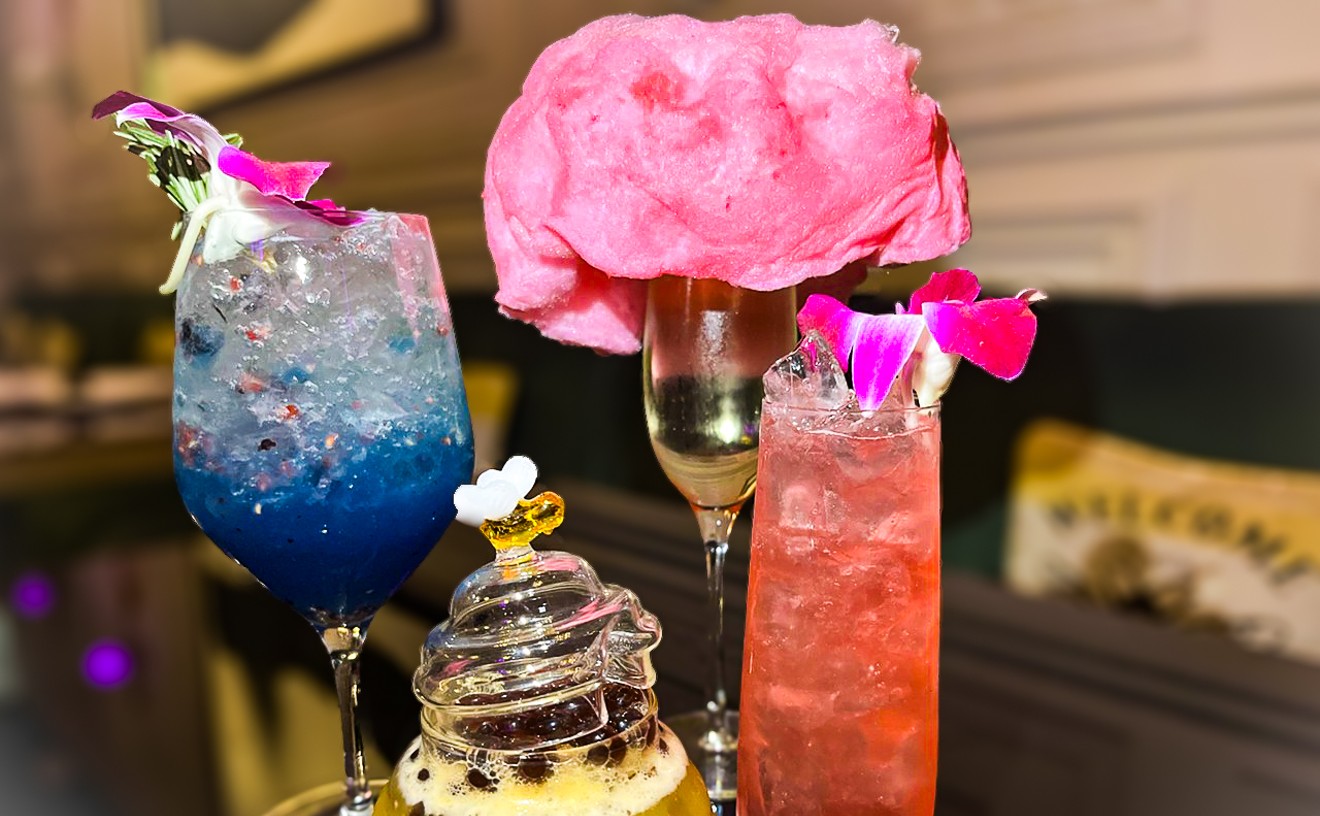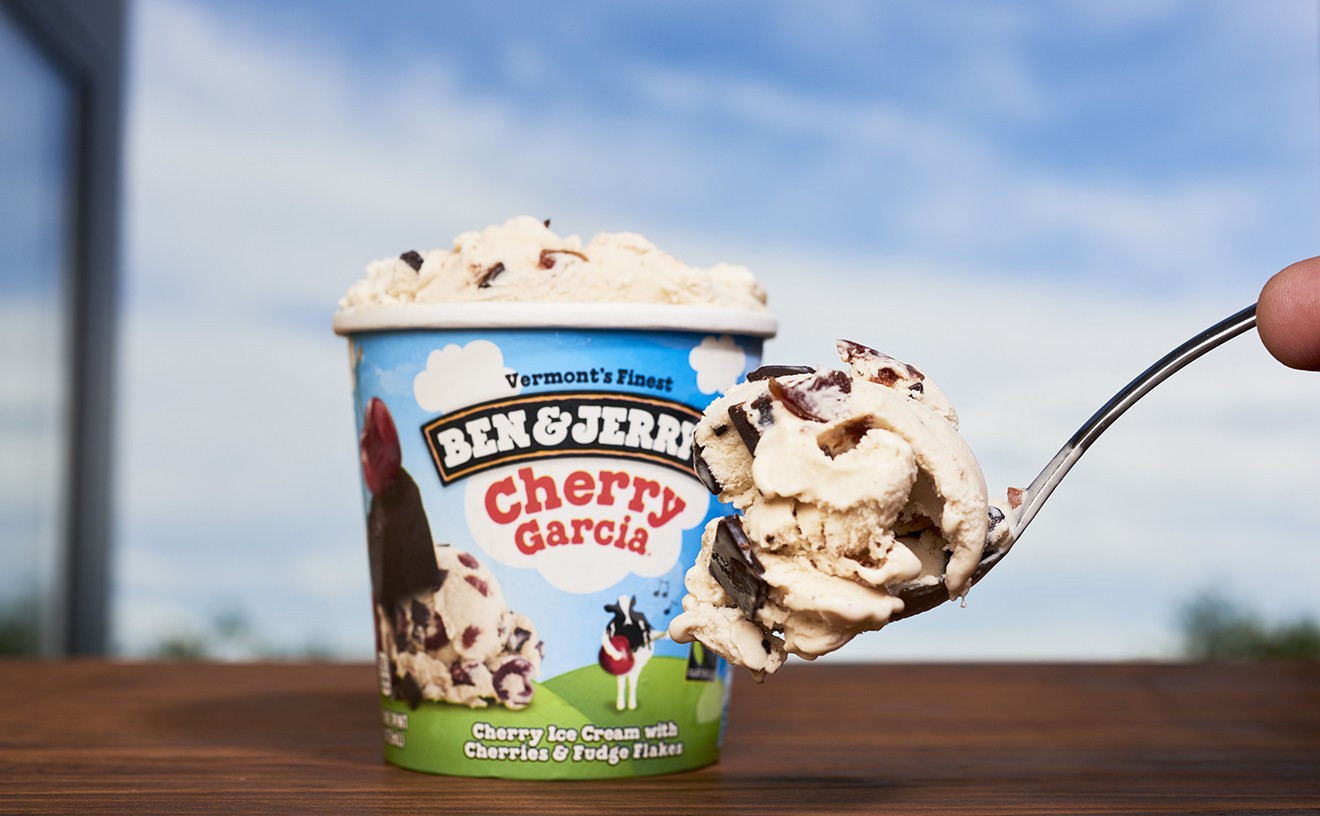Or rather, sue our editor. You wouldn't get much from the Burning Question crew, anyway--'cept a beat-up Le Car and our treasured photo of Booker Noe, Jim Beam's great-grandson, bearing his signature and a bit of bourbonly advice: "Stay on the beam."
We don't really understand the frenzy associated with a rookie female driver. Auto racing has long been the only sport in which men and women compete on the same circuit as equals. Last Friday, while adoring crowds trailed alongside IRL's sensation, Kelly Sutton and Deborah Renshaw battled in the NASCAR Craftman Truck Series race.
Besides, it's a team sport.
For someone to win--or even roll out onto the track--they need engineers, mechanics and a few guys to change tires. Oh, and a good chef.
"Race cars run on fuel; the team runs on food," says Terry Greetham, client relations manager for Andretti Green Racing. You'll never see the hospitality staff on TV, but they arrive early, leave late, run drinks and snacks to the pit crew, provide a haven away from the mob and help everyone remain focused on the task at hand. "The drivers, the crew, they don't need to be worrying about anything."
Yep, food service is the key to victory.
"Every driver has a series of steps they go through preparing for a race," adds Eddie Cheever, winner of the 1998 Indy 500 and now owner of Red Bull Cheever Racing. Any disruption in that system, such as a late meal or a missing ingredient or an overly aggressive hand on the chili powder shaker...a disaster not worth contemplating. "They live in a bubble," Cheever continues. "We don't want them out of the bubble."
Keeping drivers focused isn't much of a challenge, really: no spices, no garlic, lots of pasta. Pretty simple gig, so far. Yet race teams consist of 50 to 100 people. Then there's family, sponsors, guests of sponsors, track workers, media--up to 500 hungry people descending on a little hospitality tent expecting miracles from two cooks confined in a steamy, narrow kitchen. That's right, a chef and one assistant, perhaps six burners, one oven and two reach-in coolers packed into a trailer. Every race weekend they churn out enough meals to make fast-food chains envious. Plus they scrub pots and pans, mop the floor and greet guests. "It's tough, it's hot and if you don't keep up, you'll lose control," says Jim Sleep, chef for Marlboro Team Penske.
Next consider the vicissitudes of location and weather. Chefs must ration water at times and make sure items left sitting in an outdoor buffet line meet local health code standards. Portable equipment bounces around during long road trips and emerges banged up beyond repair. Power cuts out at the most inopportune moments, threatening a team's precious stash of refrigerated goods. No matter what, Greetham explains, "we have to come up with a solution." In Richmond one year, high winds tore apart Penske's hospitality tents two hours before lunch. They managed to seat the crowd and serve the meal--right on time. Last Thursday, IRL chef Eddie Wilson chopped vegetables while working with other team members to fix a broken air-conditioning unit.
"There's the lack of space, the heat, the refrigeration," Wilson says of his life. He catered for several presidents, both political parties and leader of the original evil empire, Mikhail Gorbachev, before opting for a portable kitchen. He also handed us a potentially deadly drink recipe, containing Everclear and blackberry brandy, but that's an aside.
"We're basically camping," Wilson adds. "You just get into the routine and have fun with it."
The routine? Most teams cook two meals a day, with two different entrées at each meal, plus special entrées for drivers and VIPs. Cherilynn Mundell of In-Field Hospitality caters to four race teams, working from one kitchen with a single assistant. They cook up different things for each team, twice a day. "When you're sleeping, I'm not," she says matter-of-factly. Teams stow only dry goods from track to track, so chefs must rush out every day to purchase ingredients, spending up to $7,000 at Sam's or local grocery stores each race weekend. "We hit town Wednesday and already had orders placed with a local distributor," says Rob Wall, chef for Rahal Letterman Racing. Daily trips to the supermarket add produce and local flair to the menu. Tim Olszewski and Mariana Wittich of Honda own discount membership tags to about 20 different grocery chains nationwide. "I like the Albertson's down the street," Wall explains, "but a great day is coming across a farmer's market."
With 13 teams, IRL hospitality pumps more than $60,000 into the local economy, on food alone. They donate unused items to local charities before leaving town.
Hate to brag, but the Burning Question crew spends about that much on alcohol during a year, so we're pretty good for the local economy, too.
Plus, we're aware of several charities.
So these chefs produce miracles from their tiny kitchens. On race day inside Texas Motor Speedway, we sat in the Marlboro Team Penske tent devouring seared tuna, flown in fresh from Hawaii, with a citrus, tomato and olive sauce. Yeah, and lots of free beer (followed by a trip to the Red Bull "party pad" for more free beer, followed by a regrettable "beer goggles" episode--turns out Danica Patrick was actually a rather large grandmother from Mesquite). In the days leading up to the Bombardier Learjet 500, we also dined on fried catfish with hush puppies and a chilled honey carrot soup at the Honda tent, an outstanding penne pasta dish prepared by the IRL chef, and grilled steak with Cheever's mechanics.
"It's a fine dining restaurant," Greetham says with only a bit of exaggeration--"in a much smaller area with less resources."
Well, not everyone thinks so.
As we stood in the Andretti Green tent, Indy 500 winner Dan Wheldon walked by and said, "Hospitality sucks." He then hastened to the kitchen for his plate. He was joking, of course. But when chef Michael Lutfy reads this, we'll see how Wheldon adapts to a pre-race dish of "habanera surprise."










